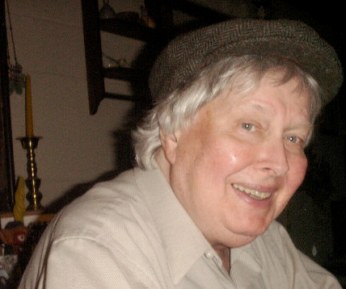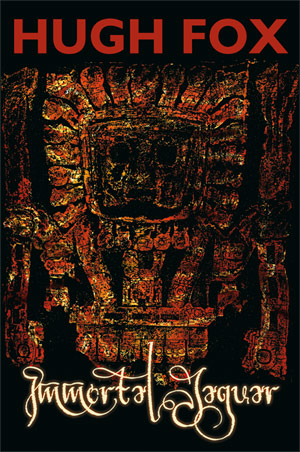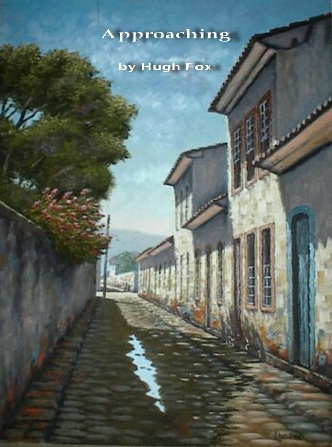

The June Featured Writer is Hugh Fox
Please feel free to email Hugh at: hughfoxyf@aol.com

LES JAMBS
by Hugh Fox
It was the final performance of the year, and the final performance ever. It was all over for the program.
The performers that night were so great. Respighi really captured it, although Joey was nervous that the ten drums, the double basses, tubas, and the trumpets were going to knock out his hearing aid.
And he was distracted by the legs of the woman next to him.
During the intermission they stayed in their seats and he tried to make small talk. She told him, “I was a plastic surgeon, fixing faces and boobs and all that crap. I’ve done it for forty years, and I’m finally retired.”
Joey was amazed. “I can’t believe that...forty years, you look....”
“I’m seventy-one,” she told him, “but I have nothing against plastic surgery for myself. My husband is deceased now so I’m single again. He used to be CFO at Ford, in the old days.”
“CFO?”
He was getting old, and everything was turning into initials, LOL, BTW, WTF. Sometimes he thought he would have been much better off in medieval times, with lots of OK-Latin and even Irish peasants were God’s people.
She started laughing.
“Let’s go out into the lobby, I’d like to buy you....”
He eagerly watched her get up. Her legs were beautiful when she was sitting down, black tights, short skirt, and not high rickety heels, but almost ballet-like flat black suede shoes. And then when she got up they became really balletic, and walking was dancing. If she’d told him that she was a Ballet Russe de Monte Carlo retiree, he wouldn’t have been surprised.
Following her out into the lobby of the Wharton Center, he tried not to keep noticing the Romeo and Juliet legs, but....
He grimaced when he saw the lines in front of the Foody-Woody concession stand. Maybe he should have reached into his pocket for one of his twenty dollar bills and macho-piggishly taken over, but there was something about her whole manner that said Empress versus his Peasantness.
And what did she get? Yogurt pretzels.
“My favorite thing!” he said when she opened the little plastic bag and handed him half a dozen.
She smiled, indulging him. “You see, there is a kind of beyond-communication between us. You’re a widower, right?”
“What are you, some sort of mystic?”
“Some sort. They speak to me a lot.”
“They...?”
“What do you think we’re surrounded by, stuttering coniferous and squeaking bluebirds, and that’s it?”
He paused, not knowing how to answer such a strange idea. People mingled about, oblivious to the thoughts permeating his own confused mind. He looked at his hands, still holding the yogurt pretzels. He knew he shouldn’t be eating them because his oncologist had told him that cancer cells love sugar, and he should stick only to flaxseed and soy and a thousand other exotic plants that he had stuck to for a while and then ignored. His cancer was going so slowly that he was beginning to think he’d make it to ninety-five anyhow, just because he was himself, luck of the Irish genetics and all….
“You really love those things, don’t you?” Her voice startled him back to the present.
“Mmmmmm....I went through an orchiectomy ten years ago and my tongue is my only pleasure left.”
“Prostate cancer?”
“Spreading everywhere.”
“My husband died from colon cancer. They took his colon out and....”
He mentally blocked her out. He didn’t want to hear any medical horror-stories, had had enough of his own over the years, his pathologist wife always coming home from the lab in the hospital with a stack of cancer stories that he never wanted to hear as he went though his salmon and shrimp and chives, frozen veggies and French sherry.
So he cut her off with, “We’d better get back in, the intermission is just about....”
And then the lights clicked on and off, the signal for the end of the intermission.
“What timing!” she laughed.
“Well, years of concerts, decades...sometimes it feels like centuries, my old friends Schuman and Respighi, Debussy. One thing I’ve never understood about Debussy was how he created so much magic, since throughout most of his life, he was miserable.”
“Escapism, that’s what it takes. That’s why I’m here tonight. To meet you. You want to come over to my palace after the concert? All paintings and special light-effects, a little out in the country, down Okemos road; big road close to Mason, but it’s two acres off the road.”
For some reason, her blunt invitation didn’t shock him. “I like that, close enough to the big roads to be convenient, but still soaked in the primitive.”
She was laughing again. “Primitive, that’s what you call Nature? I see it just the other way around. If there’s anything really primitive to me, it’s computerization. I get a kick out of going to all the fancy coffee shops around the university, and there they are: the Computer Tribes and their laptops.”
Again he didn’t know how to respond, so he said, “We should get back to our seats.”
He found himself walking back into Cobb Hall. Huge. And totally filled tonight, all the aristocratic, mainly antique faces, all the ties and tweeds and necklaces, and earrings. It was like walking into his parents’ world where everything was not just making the money, but displaying it. But wait, his parents had died decades ago; he was older now than they were when they had passed.
Then he found himself seated, hearing Resphigi, and he suddenly wasn’t there any more in mid-Michigan but back in Rome. There had been only one visit when he was twenty… Rome, Florence, Venice...and with all the Latin and Spanish he’d been soaked in at school, at times he almost understood a whole sentence, certainly lots of single words. We were still all part of the Roman Empire, weren’t we?
He had found that the Catacombs had turned into depressing, dead-soul gloom, and the Via Appia and the empire was despair itself. They should have just taken over the world and kept it, the Romanization of everything instead of all this diversity....
Then Joey realized that the audience was all standing up and applauding, going crazy, the orchestra up and bowing, the longest applause-session he’d ever heard. And he had missed it all, had not paid attention. That seemed to happen so much lately….he was always missing things.
And then, while the audience was calling for an encore, he felt her elbowing him, and she said, “Come on, the parking lot...”
They managed to get out quickly, just a few others leaving the same as they were, but the applause-roars filled the lobby too.
And suddenly he found himself out in the parking ramp, standing next to her car.
“I could just drive you to my place and then drive you back here, but,” she paused and wrote down her name and address on a little notebook sheet, “all the houses on Okemos Road have mailboxes on the road itself, with the address numbers painted on them. And you can follow me.”
The name of her car was Arbitru. He had never heard of it, and she said, “It’s electric. All it needs, really, is windmills on the roof.”
She got in and waited as he walked past two more lines of cars, getting into his old Ford Focus, her waiting to pull out until he got right behind her, then slowly out on to the highway, him right behind her, amazed at how easy it was to follow her, past all the pizza places, gas stations, insurances offices, always a Wendy’s and a MacDonald’s, a tatoo shop, tanning parlor….slowly getting country-ish and then suddenly that’s all it was, old farm houses and a mansion here and there, farm fields, and soy fields. It was the way he loved it, always imagining how it had been a century-plus back, no cars, just carriages and horses, a town-center, a Methodist or Lutheran church, once in a rare while a Catholic church, imagining Mom and Dad and the kids and no other choice but pre-TV, pre-computer; all closeness and interaction.
Her right turn-signal went on and she went into a paved, winding road through forested fields. Even in the darkness, he could tell it must have been really beautiful in the summer; roses, lilacs, and you name it would be blooming here. And then there was the house around the last turn, a Tudor-style mansion, and he parked next to her oddly-named electric car.
They didn’t walk up the front, snow-bound steps, but went through the garage into the gigantic living room. A click and the fireplace went on, another click and all the indoor and outdoor lights followed suit.
“Relax....sofa it...relax...” she told him. “I’ll get the coffee that’s already ready for you.”
“Already ready, what do you mean?”
“The voices told me you’d be here tonight. You know, They.”
And he wondered if he was in the home of a crazy person. No, he didn’t care, because he found her alluring, he thought her type of beauty timeless, and his thoughts drifted back to the first glimpse of her legs that he had seen when they had been back at the concert hall. And so he sat down, and it was the softest sofa he had ever experienced. He wanted to just stretch out and sleep, sleep for a couple of months….go into hibernation, with some music appearing in the background, Debussy’s “Les Jardins dans le Pluie,” one of his favorites.
And then she appeared with a little cart, coffee, English cups and saucers, oldish, and two dishes of ....
“What’s that?” he asked.
“Creme Brulee.”
“Oh, my God, I haven’t had that for forty years. You can’t find it around here!”
“I can find anything.”
He reached over and picked up his dish, a spoon, and then thought, French, n’est pas? Coffee, a little cream, not worrying about it being decafe or super-caffeine; did he really believe it would matter? Mr. Tension/Pain would visit him no matter what he chose to drink, spending most nights with him as he laid in pain in his otherwise uninhabited house, no dogs, no cats, just squirrels on the roof, quiet at night. He didn’t care how much noise they made during the day, in fact kind of turned them into grandchildren/family....
But he was drifting again. “The Creme Brulle is great!” he exclaimed, to yank himself back into the present.
He motioned to the window. “So much forest! And that stone building out there....everything is so beautifully lit up.”
“Everything’s theatre for me,” she said. “It was for him, too. I was his theatre.”
Would he ever understand anything she said?
And then she pulled out two photographs, almost as though from out of the air. He hadn’t seen how they had gotten into her hand.
“What’re all these?” he asked about the things he saw in the two photos.
“Legs. Black-tighted legs...sculptures....”
“Made out of...?”
“Oh…wood, ceramic....”
He studied the two photographs, and saw a hundred legs hanging from the ceiling, all wearing black tights, shoes on, most of the shoes black suede, only a few with high heels, most of them balletically flat.
“They don’t look like ‘sculptures’ to me. They look real, like some sort of place where hospitals put legs after they perform amputations.”
“I thought you would be someone who understood. You seemed so, well….bold, and ready to try things that are…” she hesitated, then said, “experimental.”
He may have wondered if he was in the home of a crazy person before, but now he was sure of it. “I’d better leave,” he told her.
She stood to block his exit. How could she, at her age, be so nimble? How did she just jump up from the couch, while he had to literally pull himself up, his joints creaking as he rose?
“They won’t let you leave,” she said. “I told you, everything is theater for him. And now we must perform the last act.”
He was beginning to feel frightened. “You’d better move. I don’t want to push you out of my way, but I will if I have to.”
“Just sit back down,” she said. “The sedatives I put in your Creme Brulle….they will kick in any second. You won’t be in any condition to drive.”
With a sinking feeling, he knew she was right. He could already feel the drugs nibbling at his consciousness. And then he sat back down on the couch, and the last things he saw before he blacked out were her lovely legs.
*****
He awoke, groggy and confused. He looked around at his surroundings, and realized he was inside the stone building in her yard. He was facing a stage. A very well-lit stage.
“What?” he asked aloud, too groggy to know if anyone was there.
She was there. She was standing next to him. “My husband, his spirit is still here. He was a leg man, you know, just like you are.”
Joey realized he was seated in a chair. “What?” he repeated.
“He used to love the musicals where all the actors danced on the stage. All those legs moving around. They talked to him, the legs. And now they talk to me.”
She suddenly turned towards him and bent over, close to his face. “How are you feeling?”
“I don’t know,” he told her. He realized the chair he was seated in was a wheelchair. “Why am I in this thing?”
“I told you that you can’t leave,” she said. “I cannot have a theater without an audience.”
Joey couldn’t stop saying that same word, “What?”
“Oh don’t worry; you won’t feel any pain for a while. At least until the morphine wears off.”
And suddenly he understood. He reached for his legs and touched thick bandages, and there was nothing past the knees, and he wondered if she had taken photographs of his legs.
When you whisper "small press" in the ears of many 60's era poets and publishers, one of the first responses you will get is "Hugh Fox." Fox was a founding board member of the Pushcart Prize, a publisher of a well-regarded avant-garde literary magazine Ghost Dance. Hugh was a reviewer of thousand of chapbooks, magazines and books, and the author of the first critical study of Charles Bukowski. In his memoir of the small press movement, Way, Way off the Road, Fox quotes Charles Plymell, a City Lights-published jazz poet and the first printer of ZAP Comics:
"... the generation that came after the Beats, was overpowered by the Beats themselves. All that media hype. My god, the media fell in love with them. They were practically rock stars. And the post-Beats, the Hippie-Yippies, whatever you want to call them, were lost in the Beat's shadow. They were and still are invisible!"
Hugh Fox was born in Chicago in 1932. He contracted polio at age 4, but was cured by a pre-Saulk experimental medicine that worked. Hugh finished four years of pre-med and a year of medicine, then got an M.A. at Loyola in Chicago and a Ph.D. in English/American Literature at the University of Illinois. Hugh moved to Los Angeles where he taught for ten years at Loyola-Marymount University.
Hugh Fox has been nominated for a Pultizer Prize in 2010.
You can see more about Hugh Fox at these links:
http://dougholder.blogspot.com/2009/02/english-poet-david-caddy-on-hugh-foxs.html
http://skylightpress.wordpress.com/2010/11/07/hugh-fox-on-skylight-press/
http://en.wikipedia.org/wiki/Hugh_Fox


